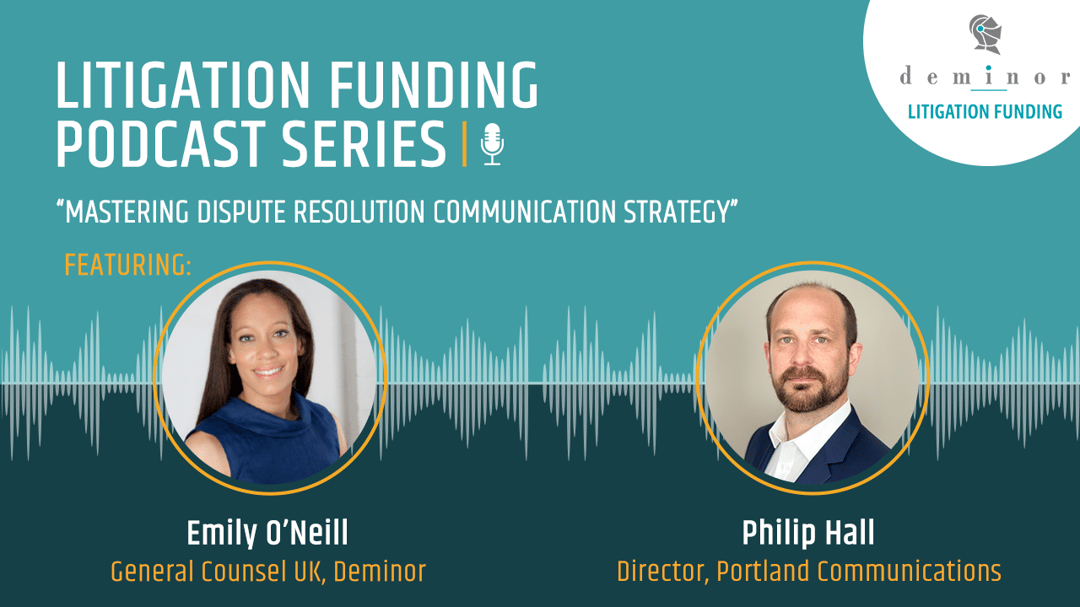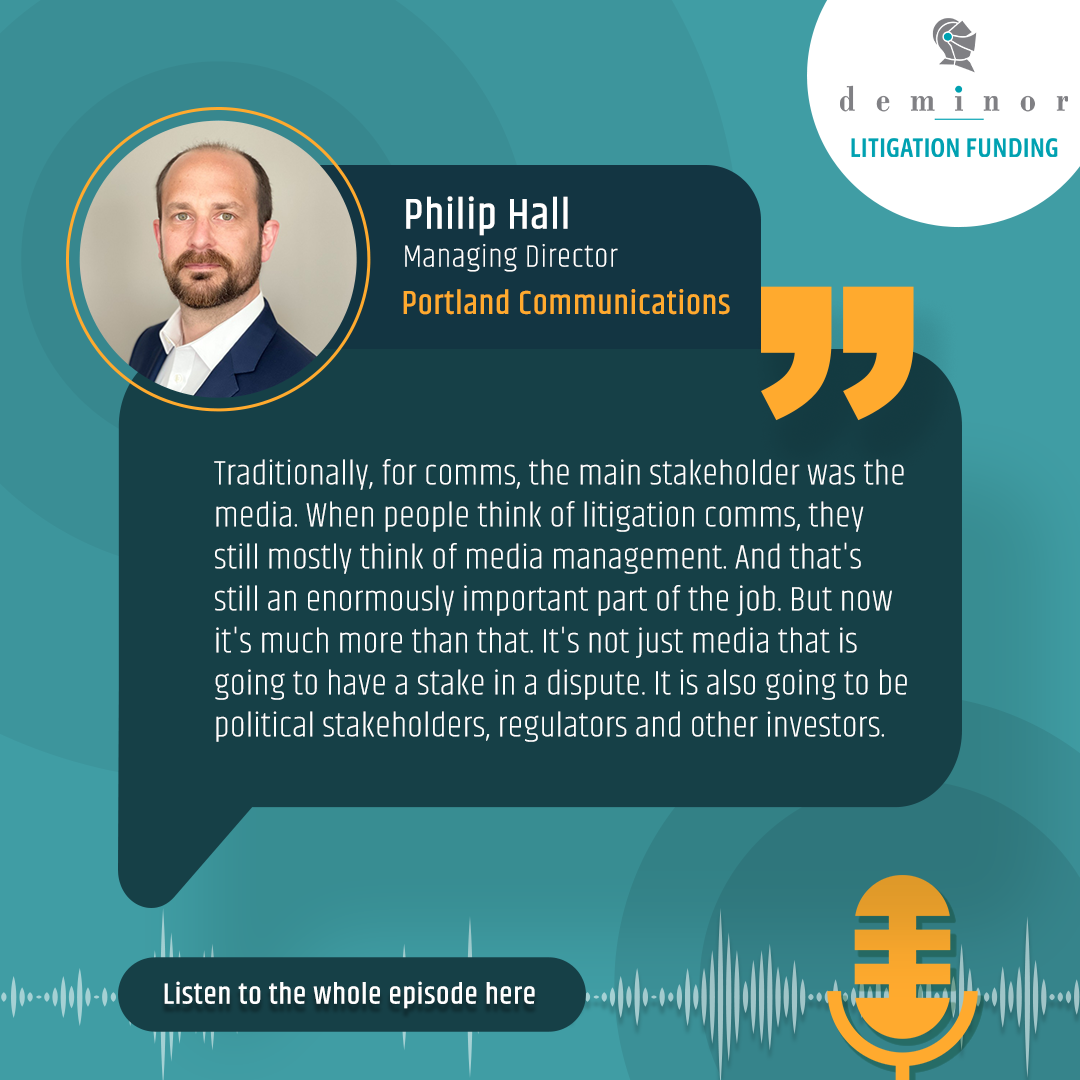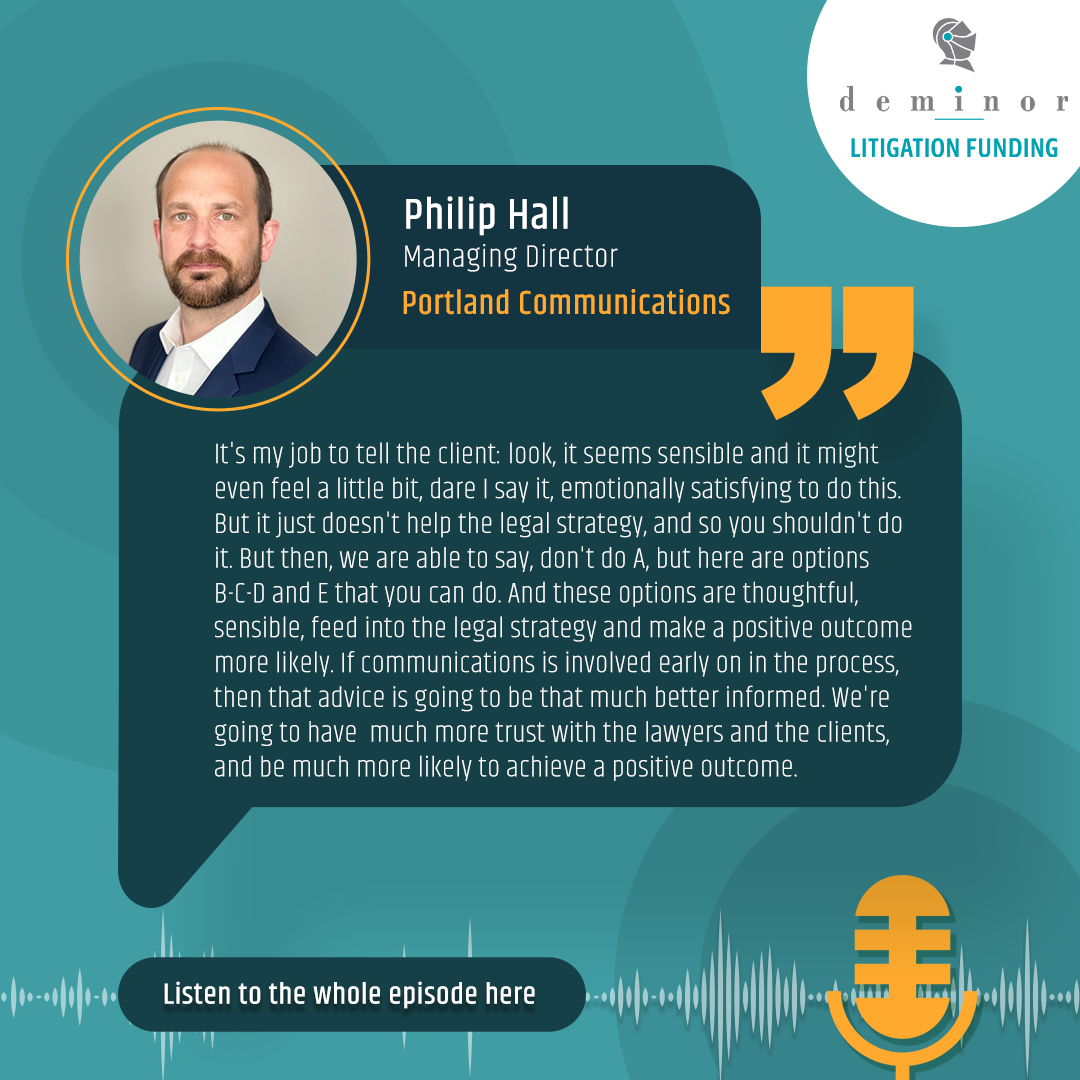In this podcast series, Emily O'Neill General Counsel UK for Deminor Litigation Funding, undertakes interviews with global professionals to discuss different aspects of litigation and litigation funding.
Deminor welcomes you to join this conversation as we summarise the key elements of the discussions between Emily O'Neill and these experts, as captured in the podcast transcripts below.

Podcast Preface:
Deminor General Counsel UK, Emily O'Neill (EON), speaks with Philip Hall (PH), Managing Director at Portland Communications. Philip leads Portland’s specialist litigation and disputes practice.
In this interview with Emily, Philip considers the strategy and impact of communications strategies in disputes and shares best practice approaches to mitigate risk and leverage competitive advantage.
Podcast Transcript:
EON – Philip, what is the role of a communications company in dispute resolution?
PH – Thanks, Emily, and thanks for having me on. I've worked in litigation, disputes and crisis communications for over 15 years now, and a lot of things have changed in that time, as you'd expect. But interestingly, the core role hasn't. What has changed? It's probably similar to your world as well, to litigation funding. What has changed is that the profile of litigation communications has risen enormously. So, it's gone from being somewhat niche to something that is increasingly a mainstream consideration for law firms. And alongside that, I would say the main consideration that's affected the role is that clients now expect a law firm to not just to solve the legal problem but to solve the whole problem. And sometimes, that whole problem is going to involve a wider range of stakeholders. Traditionally, for comms, the main stakeholder was the media. When people think of litigation comms, they still mostly think, I think, of media management, and that's true. That's still an enormously important part of the job. But now it's much more than that. It's not just the media that is going to have a stake in a dispute. It is also going to be political stakeholders, regulators and other investors.
And so, really, the role of a communications company in a dispute now is working very closely with the legal advisors to provide advice on how best to manage those other stakeholders. So the role, in a nutshell, really is, from my perspective at least, to make the lives of the lawyers easier, make it more likely that the clients of those litigators are going to be happier and more pleased with the outcome and to achieve a good resolution as quickly as possible, bearing in mind that that resolution might be achieved outside the courtroom, and it's dealing with stakeholders like the media, like the political realm, like regulators, et cetera, et cetera. I think that's how the role has changed, and that's the main role I find myself doing today.
EON – Thanks, Philip. So you've just talked about dispute communications moving from media management to including a wider body of stakeholders.
Whose responsibility is it to develop the strategy in respect of those stakeholders such as the regulators, the investors, and the political landscape? Is that something that the communications advisor does, or is that something that the law firm needs to do?
PH – That's a really important question; the short answer is that the legal strategy always comes first. My philosophy is that the legal strategy is the main thing that the client is looking to engage with and the main resolution that they're looking to achieve. We always prioritise that in whatever kind of engagement we have. However, that doesn't stop; I would hope the comms side, the audience analysis side, coming in and adding real value to that strategy and being able to contribute to it, to refine it, to offer an opinion. And then I would hope, often bringing an area of expertise that, quite understandably, the litigators or the arbitrators might not have, our ability to understand how a certain fact scenario, how a certain set of circumstances is going to be interpreted by the general public, by a sector of that public, be it investors or consumers, or how it's going to be interpreted by the political realm. That, understandably, is going to be quite different to how it might be interpreted within the confines of litigation. Now, that doesn't stop litigation coming first, but it adds, I hope, a layer of expertise, understanding and ultimately a layer of advantage that makes the resolution more likely.
EON – We see in our day-to-day that we are often asked to be involved in funding the kind of David v Goliath battles. The Davids love to go out to the media with their story, but sometimes that's not appropriate in the context of the case.
At what point in a case should the law firm start to think about their communication strategy?
PH – I mean, the obvious answer from someone in the business of litigation comms is as soon as possible; the earlier, the better. And generally speaking, that's true. But as I say, I've done it for a long time. So pragmatically, I realise that isn't always the case. And often, quite often, we are still brought in at the end of a process of litigation. A judgment, favourable or not, is coming in, and our main job is just to manage the public and the media reaction to that judgment; that still is something that we do, or in a crisis, we're brought in to manage that crisis. And again, usually the crisis has rumbled on or been fermenting for a while before we are brought on. However, to your point around a David v Goliath battle, or more traditional litigation, the overwhelming majority of work we do, we are brought on very early in the case, so we can provide that substantive advice around different stakeholders, different engagements, advise on reputation, but also advise on how the proceedings are going to be perceived by these different audiences. And to your point, quite often in David v Goliath battles, the David does want to fill his sling with whatever he can put in there, and often that is not appropriate.
It is our job, my job, to tell the client, look, it seems sensible, and it might even feel a little bit, dare I say it, emotionally satisfying to do this, but it's just, it doesn't help the legal strategy and so you shouldn't do it. But then I think the thing that we are then best placed to do is to say don't do A, but here is B-C-D and E that you can do that is thoughtful, sensible, feeds into the legal strategy and makes a positive outcome more likely. And now, if we can be involved early on in that process, then that advice is going to be that much better informed. We're going to have that much more trust with the lawyers and the clients and are that much more likely to achieve that positive outcome.
EON – How much detail does the communications firm need to have with respect to what's actually going on in the case?
Obviously, there's a lot of client-privileged information that's being exchanged with the lawyers, but how much information do you need to be able to support the firm and the client in shaping their communication strategy?
PH – Almost without exception, we are retained by the law firm. And one of the main reasons for that is because, although it's imperfect, there is some degree of benefit of privilege in that engagement. And that is my very strong preference is to be engaged by the law firm for the reasons of privilege. We're very used to navigating that, very used to navigating issues of confidentiality, which leads to the answer to your question, which is that the more information, the better. As I say, we don't presume to dictate or shape the legal strategy per se, but the more we can sensibly feed into it, the more likely we are to achieve our objective of making the lawyer's life better and easier. But also, the better informed we are, the better we are going to be at engaging with the media or whoever the stakeholder might be. And concretely, an example of that is if we are going to an FT journalist or well-informed media, they are going to start from a position of being very, quite correctly, cynical and sceptical, and our ability to answer questions, to tell the story, to tell the full story, obviously, with our client’s perspective, but to tell the full story means that we are much more likely to get a positive outcome. It's much more about in the same way you are making an argument to a judge. It is broadly analogous to making an argument to a well-informed, sceptical journalist. Different realms, of course. I wouldn't presume to put myself in the same kind of category as lawyers, but nonetheless, the more informed you are, the more your arguments are going to resonate and land effectively.
EON – Taking your work in launching Lloyd v. Google as an example, how did you approach putting together a communication strategy for that case?
PH – So, Lloyd v. Google was fascinating. It's one of the best cases I've worked on, and we were very lucky to work alongside the lawyers that started the case. I had a great time doing so and, of course, working with Richard Lloyd as well. There were sort of two buckets to that case, two or three buckets of activity.
The first one was because it was pretty novel and innovative, and the lawyers driving it had a real appetite for innovation. We were involved in the nuts and bolts. We found Richard Lloyd as the representative. We worked out how to do the media plan, and it really was kind of figuring out how to solve the problem, which is probably my favourite thing to do, to work on really challenging or innovative cases, mostly with lawyers, to work out how best to do it. So that was the first bucket.
The second bucket was because of the novelty of the case. There was a concern about making sure it was presented in a way that was understood by not just legal commentators but the general public, to make sure that actually the concept of a representative action, because of its relative novelty in the way it was put together, was broadly understood by funders, to a degree and other lawyers. And so, figuring out the thread that would hold it all together was very important.
And then the final bucket was, as you expected, a lot of engagement with the media, telling the story, making sure the media people who would write about it would do so, fully informed in a way that would raise the profile of the case, even though as a representative action, we knew that it was really important to make sure that we could demonstrate the story had landed with the public. When we launched, we were very pleased and proud that on launch day, we received very high numbers of sign-ups, even though it was only representative. We had the usual kind of sign-up to learn more and had extremely high levels of sign-ups on the first one, two, or three days.
I think perhaps the most interesting part looking back, or one of the more interesting parts looking back, was how much research played into how we addressed the problem. And so we spent a lot of time working with the law firm, with the litigators on that research component. And by that, I mean what is going to resonate with the different audiences? Why would somebody be concerned about Google allegedly taking their private information? Would someone care about the loss of control of data, et cetera, et cetera? And what would make somebody want to participate? And so for that, we ran a lot of focus groups in different areas of the UK to really drill down into what would motivate different people to take action, to be concerned about it. And that played a huge role in informing the strategy going forward because the demographics and geographic locations were very different. Things resonated differently on a spectrum from having a very strong view that a large company shouldn't do certain sorts of actions to, candidly, other areas where people were motivated by the thought of a financial reward or compensation for being engaged. And it varied enormously from region to region, demographic to demographic.
Being able to tailor a message that resonated with the right people did two things. One, it just made a much stronger campaign, which we've carried forward that learning into other campaigns. A much stronger campaign also meant a much more cost-effective and efficient campaign. I'm saying the obvious, but gone are the days where an article in the mainstream newspaper is going to reach everyone you care about because that simply isn't the case. You need to understand what it is people are looking at, reading, spending time with, and also what it is that's going to motivate people to do something. I think learning was enormously important and something we've taken forward and into almost all of the other work we've done since.
Litigation and dispute communication is about working with law firms to solve the whole problem. We are retained by law firms. We always defer to the legal strategy, but our goal is to make lawyers' lives easier and better, to make their clients happier, and to reach a successful resolution quicker because of that area of expertise. And then I think the other area which is important is media management. But it's not just media management; it is about understanding audiences, and that's more important than ever in an age where an audience is going to be enormously disjointed and get their information from a huge variety of different platforms. And if you don't start with a really deep understanding of the audience, whether it's a political niche, investors, or whatever it might be, and then understand what platform and what message you are not really taking the most efficient and effective approach to communications.
Litigation Funding Podcast Series - Next Steps and Further Information:
Thanks for joining Deminor's Litigation Funding Podcast Series as we dive deep into core topics in funding litigation.
Keep an eye out for our upcoming conversations as Deminor General Counsel UK, Emily O'Neill, speaks with several more experts to get their insights into different aspects of litigation funding.
If you would like to connect with either Emily or Philip on LinkedIn, please click on the links below:
Emily O'Neill – Deminor General Counsel UK and Global IP lead
Philip Hall – Managing Director at Portland Communications
***
Further Reading:
- https://www.deminor.com/en/case-studies/co-funder-proposes-sharing-of-litigation-funding-risk-to-leverage-deminors-in-house-due-diligence-capability
- https://www.deminor.com/en/case-studies/financing-assertion-of-patents-protecting-manufacturing-processes
- https://www.deminor.com/en/case-studies/telecoms-patent-assertion-multi-jurisdictional-campaigns
- https://www.deminor.com/en/case-studies/canadian-innovative-start-up-preparing-for-a-david-v-goliath-litigation-funding-battle
- https://www.deminor.com/en/case-studies/whats-the-risk-assessing-the-risk-of-counter-assertion-by-the-defendant-in-patent-litigation
- https://www.deminor.com/en/case-studies/overstepping-the-mark-litigation-funding-trade-mark-infringement
- https://www.deminor.com/en/case-studies/lights-camera-action-recovering-damages-for-infringement-of-rights-in-a-short-film
- https://www.deminor.com/en/case-studies/recovering-damages-for-stolen-software-through-litigation-funding
- https://www.deminor.com/en/case-studies/funding-in-the-pharma-sector-/-investing-in-a-case-where-litigation-is-already-ongoing








